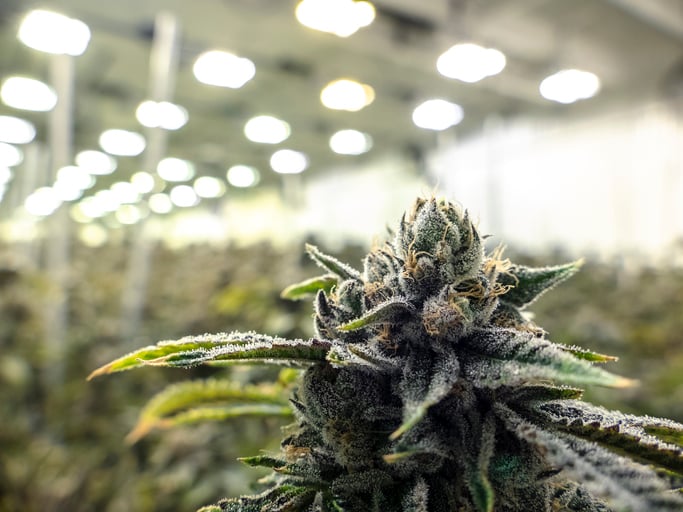Following a first quarter that was nothing short of incredible for pot stocks, the remaining nine months of 2019 left a lot to be desired. When the year ended, most cannabis stocks were not only down, but quite a few brand-name companies were bordering on multiyear lows.
If there was a silver lining (or should I say "green lining") to be found among this underperformance, it's that this precipitous decline in marijuana stocks has offered investors a second chance to buy into an industry that should see sales grow from $10.9 billion worldwide in 2018 to at least $50 billion by 2030. Even Wall Street appears to be slowly coming around to the idea that cannabis stocks may have bottomed out.

Image source: Getty Images.
The largest pot stock just received a big upgrade
On Tuesday, Jan. 28, before the opening bell, analyst Tamy Chen at BMO Capital Markets upgraded Canopy Growth (CGC 2.87%), the largest marijuana stock in the world by market cap, to outperform from market perform. Chen also raised her company's target price on Canopy from $25 Canadian ($18.96) to CA$40, which represents perceived upside of 41%.
Why the upgrade? For one, Chen and her team believe that Canopy Growth can outpace Wall Street's fiscal third-quarter estimates (it's slated to report its operating results in about two weeks). The note to clients suggests that Canopy now has a much better product mix relative to domestic demand, and has done a particularly good job of focusing on value-based products. Even a modest third-quarter beat "could shift investor sentiment on the stock," Chen said.
While BMO Capital Markets expects other growers to have seen strong follow-through in value-added sales in their upcoming quarters as well, few pot stocks have as much capital in tow as Canopy. With CA$2.74 billion in cash, cash equivalents, and short-term investments as of the end of its most recent quarter, financing isn't a concern.
Though not specifically mentioned in the BMO client note, it should also be pointed out that Canopy is potentially Canada's largest producer, it has the second-broadest international presence, and it's one of a small handful of cultivators with a supply deal in every province. It may not be the most popular cannabis stock, but it's certainly the most well-known and potentially is the poster child of the marijuana movement.

Image source: Getty Images.
Wall Street has Canopy Growth all wrong
Unfortunately, I'd contend that BMO Capital Markets' upgrade of Canopy Growth is premature since it overlooks a number of serious flaws with the company and industry.
Beginning with the industry, BMO appears to have swept Ontario's supply issues under the rug. Even with the largest province in Canada by population changing how it approves retail licenses this year, it's going to take a few months before we begin to see a significant number of dispensary licenses issued. That's not going to have any impact on Canopy Growth's upcoming report, or even the one or two quarterly reports thereafter. As we've seen from retail sales figures from Statistics Canada, sales are moving higher on a monthly basis, but much slower than anticipated. That does not bode well for Canopy Growth.
Next, it can't be overlooked that the company has been losing money at an extraordinary pace. Even if it manages to somehow modestly top sales expectations, it doesn't negate that the company has lost almost CA$389 million on an operating basis over just the past two quarters combined, or has seen its cash hoard dwindle from nearly CA$5 billion after receiving an equity investment from Constellation Brands in November 2018 to the aforementioned CA$2.74 billion. Canopy's cash buffer is most definitely shrinking.
Meanwhile, as the company's cash balance shrinks, its goodwill has ballooned to more than 23% of its total assets. While goodwill is common following an acquisition, Canopy's CA$1.91 billion in recognized goodwill would seem to suggest that it grossly overpaid for the businesses it's purchased. This looks like a writedown that's just waiting to happen.

Image source: Getty Images.
Despite Canopy having an impressive international presence, BMO Capital Markets' upgrade also appears to be overlooking how little return the company will receive from these overseas assets in the foreseeable future. Many foreign markets are still in the process of establishing medical marijuana regulations and are therefore not ready for large imports of product. Likewise, cold water has been poured on the cannabidiol parade in the U.S. by the Food and Drug Administration, which makes Canopy's $150 million (that's in U.S. dollars) hemp processing plant in New York State seem a bit excessive.
There's also little credence being given to the fact that while new CEO David Klein does have experience in consumer packaged goods as chief financial officer for Constellation Brands, he has no direct experience working in the marijuana industry. I don't doubt Klein's ability to cut costs at the company, which absolutely needs to be done (especially from the perspective of share-based compensation). What I do doubt is Klein's understanding of how to build a marijuana business without spending beyond its means.
In short, Canopy Growth is an absolute mess, from its income statement to its balance sheet, and there's no flip-the-switch panacea that's going to change that. To suggest that investor sentiment will shift because of a modest earnings beat is to completely gloss over a laundry list of past mistakes that will continue to haunt Canopy Growth for the foreseeable future. Suffice it to say that smart investors are going to stick to the sidelines until this company demonstrates tangible progress.






